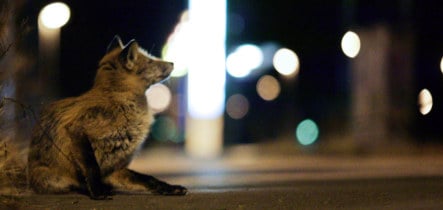Everybody in a school classroom has a role. There is the clown, the know-it-all, the leader and the bully. Dave Taylor was the magician. He had bottomless pockets out of which he could tug string, horse chestnuts, marbles, bubblegum, a penknife, even a broken crucifix. His most potent treasure was the stink bomb, a glass tube filled with a liquid which when shaken and scattered could make the whole back row of the school chapel choke and gasp for breath.
I thought of Dave (now a senior executive in an oil company) when I entered my garden in Berlin the other day and was almost overwhelmed by a hideous gaseous stench. It was, a knowledgeable friend told me, the urine trace of a fox. The great English poet Ted Hughes, a man of the country rather than the city, described how inspiration entered his brain: “With a sudden sharp hot stink of fox / it enters the dark hole of the head.”
Well, I don’t know about inspiration, but he certainly got that aroma right: the sharp hot stink. Ten or twenty years ago it would have been unthinkable for someone living in the centre of a busy European city to have a fox prowl around the lawn. Now whenever my terrier Mac behaves strangely I know that a wild animal has strayed on to our territory.
Slowly I am getting the impression that animals are filling the gap left by humans. There is the raccoon living in the underground garage of the Park Inn Hotel, which is located on Berlin’s grey and very un-park like Alexanderplatz. Of course, with a ridiculous name for a hotel like that they deserve to have a skunk in their laundry room. Experts say there are now 120 raccoon families in Berlin, most for some reason in Steglitz. Forest owls are now hunting mice in Frohnau, there are badgers in Siemensstadt, and the deer about to enter the mating season will again mess up traffic again on the Koenigsallee. Wild boar are plodding their way through plots of Berlin’s hobby gardeners, massacring legions of plastic gnomes, munching on German flags and sniffing at empty beer crates.
Berlin might have reversed its population decline – Sterbeüberschuss (death surplus) how I love that word! – for the first time since the war in 2007, but the the animal population has been growing for years. It’s a phenomenon that applies to much of the depopulated eastern part of Germany, not just Berlin.
The Prignitz region in Brandenburg, abandoned by humans, is beginning to look like a nature reserve. Wolves are repopulating old Soviet artillery ranges before moving closer to the towns. They are on the move across Europe and the reason is always the same: they sense a change in human behaviour. Why did Italian wolves move across the Alps to France? Because the mountainside sheep farmers in France were allowing their sheep to graze without protection as young men left the villages for better work in the cities.
Well, we don’t yet have wolves on the Ku’damm in Berlin. But we do have foxes. There are some 2,000 in town. Last year, I saw a solitary fox amble down the Schlüterstraße past Ovest (lamb chops €19), past a salon belonging to star stylist Udo Walz, past NU (sirloin steak €18.50), across the Kantstraße and past Good Friends (Peking duck €20 per person).
The post-modern Berlin fox simply has a nose for the rubbish-bins of the rich. Last week I saw another fox trotting down Stuttgarter Platz past the Hanky-Panky bar towards a fashionable Italian restaurant. If I were a property owner there I would raise the rents: there is no surer sign of a district becoming more prosperous than the presence of a fox.
If one implanted microchips in the city’s 2,000 foxes, you would soon establish Berlin social contours. There is no logic in a fox hanging around a poorer district like Neukölln unless it has a Döner kebab habit.
The wealthy in the city – those with the fullest and most rewarding rubbish-bins – are concentrated in ever more narrow strips. In other cities the well-off steadily colonise poorer neighbourhoods, “discover” them, make them fashionable; property prices rise, private spending too.
This is not really happening in Berlin. Neukölln and Wedding – with the exception of a couple of streets – are as impoverished as they were a decade ago. The wealthy in Berlin move – except when they go clubbing – in the same zones as if they were stockaded off from the rest of town. The foxes know this better than most.
By the way, there is nothing to fear from a fox. Rabies has been wiped out, thanks to immunisation tablets secretly hidden in chicken-heads, or wrapped in fat, fish food and paraffin. As a result the foxes are probably healthier than we are.
My suggestion is this: instead of killing them and making them into amusing fur coats, we should train them to be pets for the rich and the famous; we could upgrade them from the dustbins of expensive trattorias and have them sit peacefully at the feet of their wealthy mistresses. They are already here; why not make them legal?
A pity, only, about the smell.



 Please whitelist us to continue reading.
Please whitelist us to continue reading.